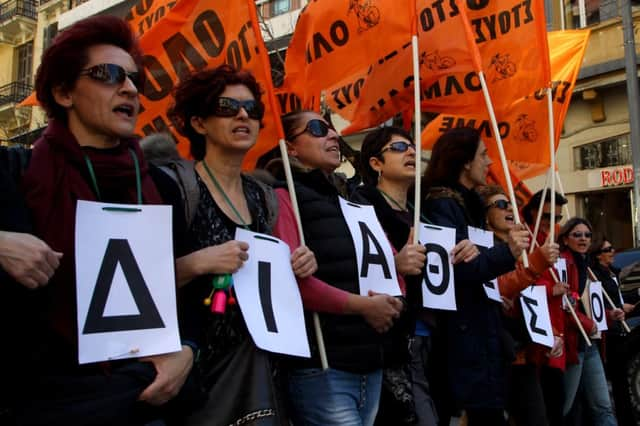Thousands march in Athens over public job cuts


Teachers, municipal workers and pensioners yesterday joined the 24-hour walkout by the country’s biggest public sector union ADEDY, which shut schools and left hospitals staffed by emergency workers while parliamentarians debated a bill on public sector reforms.
“They won’t stop unless we stop them,” ADEDY said in a statement attacking the reforms as “an assault on workers’ rights”.
Advertisement
Hide AdAdvertisement
Hide AdRaising mops and brooms in the air, dozens of cleaning ladies protested outside parliament, the focal point of anti-austerity protests, and high school teachers chained themselves to the metal barriers barricading the assembly.
“Traitors out of our country!” read one placard.
Sentiment about anti-austerity remains high in Greece, where repeated bouts of belt-tightening since it was rescued from bankruptcy in 2010 have left three times as many Greeks jobless, pushed up homelessness and eroded living standards.
Labour unions fear Greece will have to impose further cuts in the coming years to meet the targets of its €240 billion (£200.8bn) bailout deal with the European Union and the IMF.
But the minister tasked with overhauling a state sector long-criticised as a hotbed of patronage jobs and overspending, defended his job, branding the public sector “the sick child which, to a large degree, led us to today’s [economic] crisis”.
“We will not back down,” administrative reform minister Kyriakos Mitsotakis told parliament. “We will take the skeletons out of the closet.”
Greece’s lenders have demanded 11,400 public sector layoffs this year, the fifth straight year of job cuts in the sector.
Unemployment stood at 27.5 per cent in December, little changed from a record high 27.7 per cent in October, despite signs of an economic recovery.
“We want our lives back,” Maria Portelanou, a 58-year-old schoolteacher and mother of two jobless children, told reporters at the rally. “The government should pack up and leave.”
Advertisement
Hide AdAdvertisement
Hide AdParties opposing austerity from across the political spectrum are expected to do well in European Parliament elections in May, opinion polls show.
ADEDY and private sector union GSEE have brought people on to the streets repeatedly since the crisis erupted, with as many as 100,000 taking part in some demonstrations. But turnout has been low in the last year as a growing sense of resignation sets in among Greek workers.
Greece’s economy has shrunk by almost 24 per cent over the past six years in the deepest and most protracted peace-time recession in its history. The country’s fragility dates back to the 1990s. It had been overspending for many years, but after it left the drachma for the euro in 2001, public spending soared.
Public sector wages rose 50 per cent between 1999 and 2007, far higher than in most other eurozone countries and huge debts were run up paying for the 2004 Athens Olympics.Treasury income was hit by widespread tax evasion and its budget deficit spiralled out of control. When the economic crisis hit and banks called in loans, Greece could not pay. The European Union bailout of more than €100bn was handed over on the condition Greece embarks on austerity.
Last month the Lancet medical journal and Cambridge University published research charting rising rates of HIV, tuberculosis, depression and infant deaths linked to huge cuts in healthcare spending.
Since the economic crisis hit in 2009, health spending has been slashed and hundreds of thousands of people have been left without health insurance.
Suicides in Greece increased by about 45 per cent between 2007 and 2011.